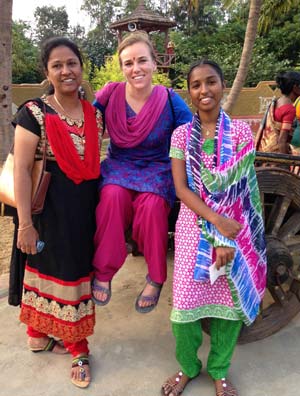Aimee's Master’s Research in India
 Many students looking for opportunities to do research overseas - or work for which they can receive academic credit - must find organizations, or positions, which fulfil their school’s requirements.
Many students looking for opportunities to do research overseas - or work for which they can receive academic credit - must find organizations, or positions, which fulfil their school’s requirements.
That was Aimee’s challenge. She’d been to India before, and wanted to return to gather data for her master’s thesis in the field of International Community Leadership. Her school had certain criteria for the work she needed to complete and the kind of host organization she’d be working with in India.
So ELI placed her in Chennai, the capital of the southern Indian state of Tamil Nadu where Aimee worked at a respected social services non-profit that focuses on impoverished and trafficked women, disadvantaged children and the elderly. In all, she spent ten weeks in Chennai.
The placement is unique in that researchers, volunteers and interns actually live on site, in residential rooms located above the non-profit’s offices. The building is part of the same compound housing many women and children under the group’s care.
“I loved the experience,” Aimee says, “And I was able to gather all the data I needed. More than I needed, in fact.”
She admits, the first couple of weeks were a little tough. She shopped for her food at the local markets and ate at nearby restaurants. For a long while, she was the only foreigner working at the non-profit.
“It’s definitely good to be independent and self reliant when you work in a place as different as India. But the local staff was very helpful and always looked out for me. Then some volunteers arrived from Australia and so that livened things up a bit.”
Not that Aimee had much free time on her hands. Living on site meant she was working pretty much all the time, just like she wanted to. Her day began at the organization’s administrative offices, where she assisted the executive director. She answered emails, helped out with grant proposals, data gathering and project documentation. In doing so, she saw the variety of work and challenges faced by even a stable and successful social services organization in the developing world.
“It was a huge learning opportunity,” Aimee says.
Time was set aside with the executive director for one-on-one work and consultation on Aimee’s project; in the afternoons she often accompanied staffers in field work, went on hospital visits and to meet with collaborating organizations.
Although many of the staffers spoke English, language was a times a barrier. Aimee relied on translators - and on some Hindi she’d learned during her first stay in India. In all, she conducted a dozen interviews, and gathered a wealth of data, for her thesis.
“I saw slightly cheaper companies to go through than ELI,” Aimee says. “But ELI was the only one that could place me in such a perfect setting for my research, a setting that also fit the criteria set up by my college.”
Today Aimee is interviewing for jobs in her field, and has no doubt the India experience will be an asset.
“In Chennai, I accomplished what I set out to do - and I loved doing it.” she concludes.
Good luck, Aimee - and namaste!
To learn more about projects in India, click here.
Interviews
- ARGENTINA - HIV
- BRAZIL - Wildlife
- BRAZIL - Wildlife
- CAMBODIA - Buddhist Monks
- CAMBODIA - Children
- CAMBODIA - Microfinance
- CHILE - Literature
- CHILE - Equine Therapy
- CHINA - Journalism
- CHINA - Urban Planning
- ECUADOR - Medical
- ECUADOR - Teaching
- ECUADOR - Physical Therapy
- ECUADOR - Veterinary
- ECUADOR - Youth
- GHANA - Orphanage
- GUATEMALA - Teaching
- INDIA - Women's Programs
- INDIA - Health & Youth
- INDIA - Journalism
- INDIA - Women's Empowerment
- IRELAND - Art Gallery
- IRELAND - Art
- IRELAND - Law
- IRELAND - Museums
- IRELAND - PR
- IRELAND - Veterinary I
- IRELAND - Veterinary II
- MEXICO - Youth
- NEPAL - Construction
- NEPAL - Orphanage
- NEPAL - Orphanage
- NEPAL - Veterinary
- NICARAGUA - Teaching
- NICARAGUA - Unwed Mother Support
- PERU - Teaching
- PHILIPPINES - Nutrition
- PHILIPPINES - Nutrition
- PORTUGAL - Fighting Food Waste
- PORTUGAL - Housing for the Poor
- SOUTH AFRICA - Public Health
- SOUTH AFRICA - Public Health
- SOUTH AFRICA - Engineering
- SOUTH AFRICA - Nutrition
- THAILAND - Elephant Camp
- THAILAND - Elephant & Medical
- THAILAND - Journalism
- THAILAND - Physical Therapy
- UGANDA - Medical
- UGANDA - Medical
- UGANDA - Medical
- UGANDA - Microfinance
- VIETNAM - Pharmacy
- VIETNAM - Women

